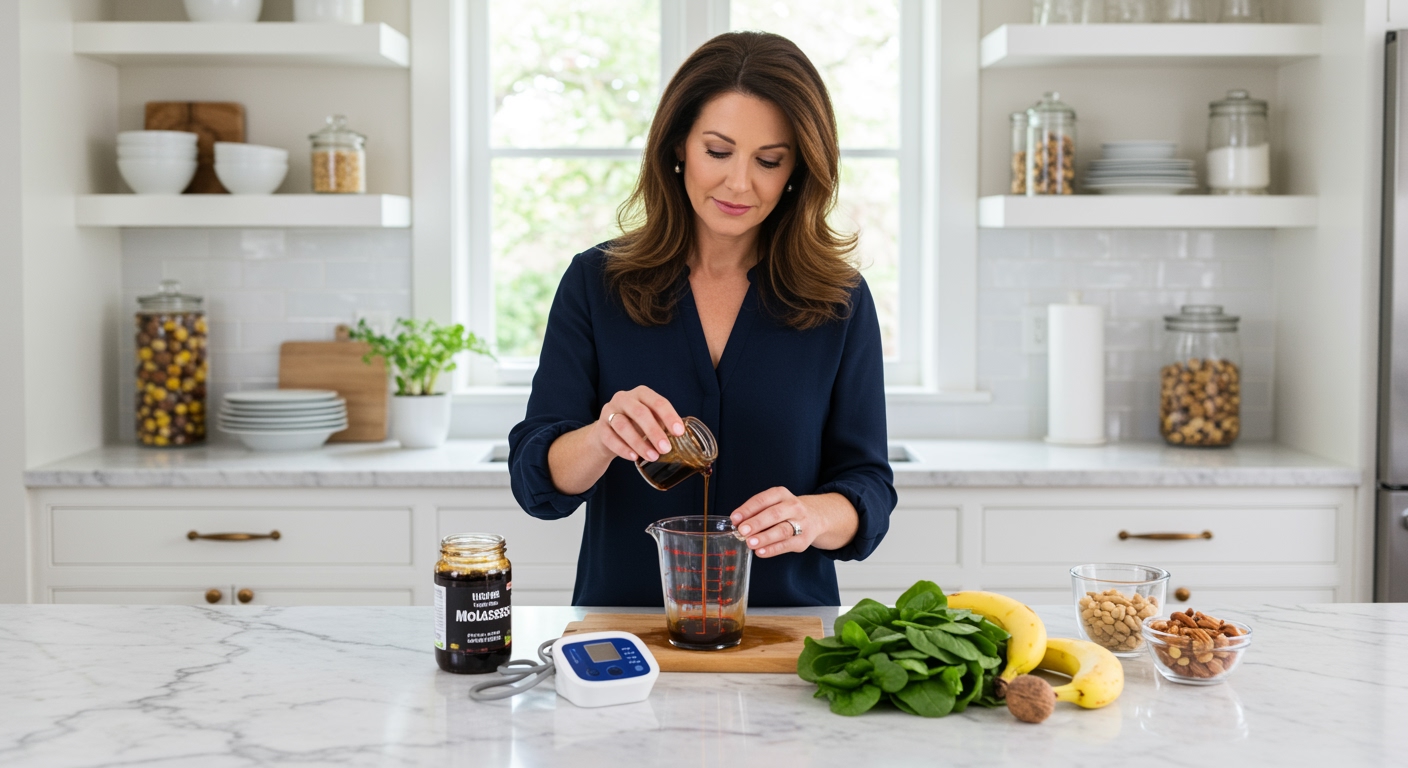✪ Key Takeaway: Molasses contains potassium and magnesium that may help raise low blood pressure, but effects are modest and temporary.
Introduction
Your grandmother swore by molasses for everything from anemia to fatigue, but can this thick, dark syrup actually help with low blood pressure?
You might be wondering about molasses because you have hypotension and want natural ways to support your cardiovascular health without relying solely on medications.
Hi, I’m Abdur, your nutrition coach and today I’m going to explain exactly how molasses affects blood pressure, what the science says, and whether it deserves a place in your low blood pressure management plan.
What Makes Molasses Different From Regular Sugar?
Molasses forms when sugar cane juice gets boiled down to extract white sugar crystals.
The thick, dark liquid left behind contains concentrated minerals that were stripped away from refined white sugar.
Blackstrap molasses, the third boiling, has the highest mineral content and lowest sugar concentration of all molasses types.
One tablespoon of blackstrap molasses provides about 498 milligrams of potassium, which equals roughly 11% of your daily needs.
It also delivers 43 milligrams of magnesium, plus smaller amounts of calcium, iron, and B vitamins.
These minerals play crucial roles in cardiovascular function and blood pressure regulation throughout your body.
✪ Fact: Blackstrap molasses contains 10 times more potassium than the same amount of white sugar.
How Do These Minerals Affect Blood Pressure?
Potassium works as a natural vasodilator in your cardiovascular system.
When you consume adequate potassium, it helps your blood vessels relax and widen, which can increase blood flow and raise blood pressure in hypotensive individuals.
Magnesium supports this process by regulating calcium channels in your heart muscle and blood vessel walls.
Your body needs magnesium to maintain proper electrical signaling between heart cells, which affects both heart rate and blood pressure.
These minerals also help your kidneys maintain proper fluid balance, which directly impacts blood volume and pressure.
However, the amounts in molasses provide only modest effects compared to therapeutic doses from supplements or medications.
✪ Pro Tip: Combine molasses with other potassium-rich foods like bananas and spinach for better mineral absorption.
What Does The Research Say About Molasses And Blood Pressure?
Direct research on molasses and blood pressure remains extremely limited in medical literature.
Most studies focus on individual minerals like potassium and magnesium rather than whole food sources like molasses.
Research shows that increasing dietary potassium intake can help normalize blood pressure in people with both high and low blood pressure.
A systematic review found that potassium supplementation had modest but consistent effects on blood pressure regulation.
However, these studies typically used much higher doses than what you would get from reasonable amounts of molasses consumption.
The sugar content in molasses also complicates its potential benefits, as excessive sugar intake can negatively affect cardiovascular health over time.
✪ Note: One tablespoon of molasses contains about 15 grams of sugar, which equals nearly 4 teaspoons.
Should You Use Molasses For Low Blood Pressure?
Molasses can be a supportive addition to your low blood pressure management plan, but it should not be your primary strategy.
The mineral content provides some cardiovascular benefits, but the sugar content limits how much you can safely consume daily.
One tablespoon per day mixed into oatmeal, yogurt, or warm milk represents a reasonable amount that provides minerals without excessive sugar intake.
Choose blackstrap molasses over lighter varieties for maximum mineral density and lower sugar concentration.
Combine molasses with other evidence-based approaches like adequate hydration, regular physical activity, and sufficient salt intake if recommended by your healthcare provider.
Always consult your doctor before using molasses therapeutically, especially if you take medications for blood pressure or have diabetes.
✪ Pro Tip: Start with one teaspoon daily and gradually increase to assess your individual tolerance and response.
The Bottom Line
Molasses contains beneficial minerals that may provide modest support for low blood pressure, but it works best as part of a comprehensive approach rather than a standalone solution.
Real nutrition success comes from consistent daily choices, not magical quick fixes from any single food.
I would love to hear about your experience with molasses or any questions you have about managing low blood pressure naturally – please share your thoughts in the comments below.
References
At NutritionCrown, we use quality and credible sources to ensure our content is accurate and trustworthy. Below are the sources referenced in creating this article:
- Dr. Axe: Blackstrap Molasses Benefits
- The Happy Hot Mess: Benefits of Blackstrap Molasses
- With Power: Understanding Blackstrap Molasses Benefits
- Core Academic: Molasses Nutritional Research





